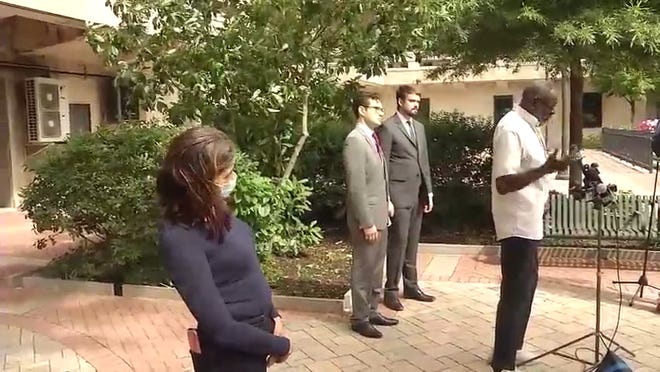- If you want to appeal a parking ticket in Wilmington, you first must submit the appeal to the city’s Office of Civil Appeals.
- You can mail or hand deliver the appeal, or file online.
- If the city’s administrative office denies your appeal, you have the right to take your case to the Justice of the Peace Court.
- To request a court hearing, you must download the form from the city’s website and mail or hand deliver the document.
- Once the city has sent your court hearing request to JP Court, the court administrators will schedule your case.
You didn’t make it back to your car before the meter ran out.
Perhaps you were unaware that your residential parking permit expired.
Maybe you were parked in a restricted area that wasn’t adequately marked.
Whatever the reason for that dreaded piece of paper fluttering against your car’s windshield, every person has the right to appeal a parking ticket and have their day in court, but that process in Wilmington can be quite daunting.
The city’s parking enforcement policies and procedures have been under scrutiny since a federal civil rights lawsuit was filed in September 2021. The suit argues that Wilmington is violating drivers’ constitutional rights by allowing companies to tow cars, scrap or sell them and keep the proceeds.
Wilmington’s appeals process has been riddled with issues for even longer, from miscommunication to no communication to tacking on late fees when a ticket has been appealed.
RELATED:Why Wilmington wants talks on parking ticket woes behind closed doors
City officials have been reticent about discussing its parking enforcement practices and feigned ignorance of any issues with its appeals process.
1. Submit an appeal to Office of Civil Appeals
If you get a parking ticket in Wilmington that you want to fight, you must first submit a request to the city’s Office of Civil Appeals within 21 days of receiving the citation.
Steps for appealing are on the ticket. You can mail or deliver your appeal to city offices, or file online.
The administrative office will issue a decision within “15 business days,” according to an automated email sent to those who appeal online.
2. Denied. Now what?
The odds of the city granting an appeal are not in the driver’s favor.
The denial rate has averaged about 60% since 2015, according to the city administrative office’s data. The annual percentage of denials was lowest in 2013 and 2014 at 13%, but has remained above 50% nearly every year since. In fact, Wilmington denied 69% of appeals in 2017, the highest percentage in the last 10 years, according to a Delaware Online/The News Journal analysis of ticket and appeal data from 2012 through 2022.
The number of parking tickets issued annually averages about 55,000. Fewer tickets were issued in 2020 and 2021 due to the pandemic, but last year’s 50,060 tickets are bringing numbers back to normal levels.
FOR SUBSCRIBERS:Tow company bid $0 storage fee, but charged Wilmington drivers thousands anyway
To appeal the city’s decision, a driver must submit a request for a court hearing to the city appeals office within 15 days of receiving the denial. The city is responsible for sending the request to JP Court, which then sends a summons to the person seeking to appeal.
3. Getting into court
At the same time that denials have increased, appeals sent to Delaware’s Justice of the Peace Court have dropped.
The percentage of appeals sent to court decreased by more than half, from an average of 3.9% sent to JP Court from 2012-15 to 1.2% from 2016-21.

Ken Grant, a parking advocate and public affairs professional, fears mixed communications and a disorganized city system may be preventing aggrieved drivers from exercising their due process rights. Grant recently requested copies of the forms submitted for requesting a hearing with the Justice of the Peace Court and was told the city doesn’t keep those records.
“That’s a citizen’s due process right that you are playing with there,” Grant said. “The data from JP court is very useful, but if the breakdown is happening before JP court gets anything… that’s the problem. How many people are trying to do the right thing?”
4. What about due process?
While due process applies to any instance where the government deprives you of life, liberty or property, the quality of the process and how much you get depends on the stakes, attorneys say.
“You don’t get a full judicial trial where you can call witnesses and have a jury if the stakes are low and the value added is low given the circumstances. There is a balancing test to determine how much process you get,” said Jud Mathews, associate dean for Academic Affairs and law professor at Penn State Law in University Park. “In this case, for parking tickets, it’s going to be pretty limited.”

Will Aronin, an Institute for Justice attorney who is leading the towing lawsuit against Wilmington, added that governments must give notice of a parking ticket and allow for drivers to be heard.
“The minimum hallmark of due process is notice and an opportunity to be heard,” he said.
LAWSUIT UPDATE:‘Wilmington can’t have it both ways,’ federal judge orders towing suit to move forward
The pandemic prompted many entities to shift appeal processes to paper, which Aronin said makes it “a lot harder to prove your case.”
5. Go before a judge
Once Wilmington’s appeals office sends a hearing request to JP Court, administrators there will schedule the case and “send a summons out to the person who appealed,” said Liz Petrick, deputy court administrator for Justice of the Peace Court in Delaware.
If you seek a court hearing, it comes at a cost, which administrators say may deter some from fighting the city’s denial.
Along with the parking citation costs, another $35 is tacked on for court and security fees.
CHANGES PROPOSED:Wilmington is promising parking reforms. Do they mean it this time?
There is also no way to submit a court hearing request digitally. The form must be downloaded from the city’s website and either mailed or hand-delivered to the Office of Civil Appeals. As mentioned earlier, Wilmington has claimed in a Freedom of Information Act request response that it doesn’t keep these records.
Of the thousands of appeals denied by the city, only a handful are appealed to JP Court each year.
Before a judge – specifically in JP Court, it’s a magistrate – you’ll still have a 50/50 shot of success. From 2016-21, JP court denied appeals 55% of the time. Only in 2019 did the odds swing in the appellant’s favor with 59% of appeals granted.
Got a tip? Contact Amanda Fries at afries@delawareonline.com. Follow her on Twitter at @mandy_fries.